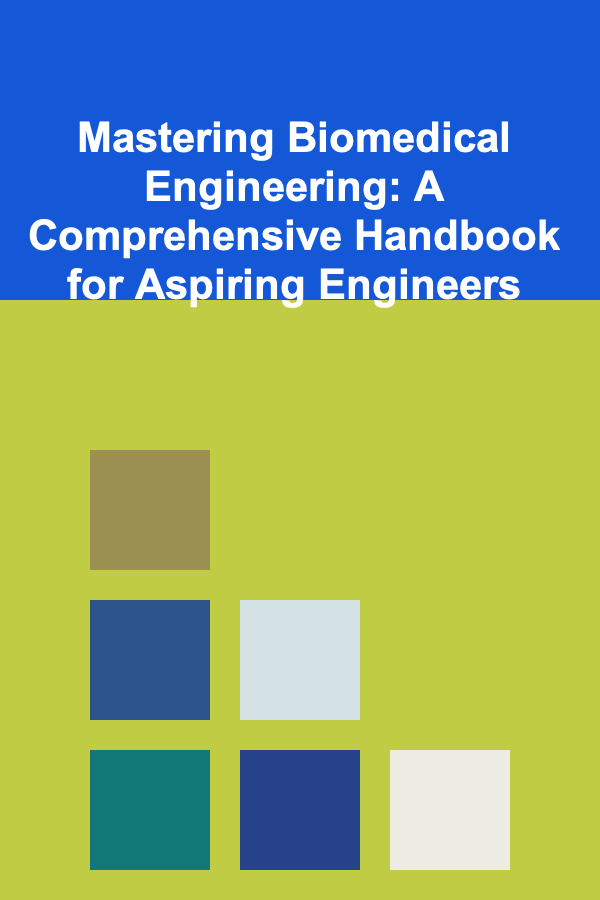
Mastering Biomedical Engineering: A Comprehensive Handbook for Aspiring Engineers
ebook include PDF & Audio bundle (Micro Guide)
$12.99$11.99
Limited Time Offer! Order within the next:

Biomedical engineering is one of the most dynamic and rapidly evolving fields in modern science and technology. By combining principles from engineering, biology, and medicine, biomedical engineers design innovative solutions to address pressing healthcare challenges. Whether you are just beginning your journey in biomedical engineering or looking to deepen your knowledge, this guide will provide actionable insights to help you navigate the path toward becoming a skilled biomedical engineer.
Understanding Biomedical Engineering
Biomedical engineering (BME) is an interdisciplinary field that merges engineering principles with biological and medical sciences to improve healthcare. Biomedical engineers design medical devices, develop new technologies for patient care, and work on cutting-edge innovations that enhance human health.
The Core Disciplines of Biomedical Engineering
Biomedical engineering covers a broad range of topics and applications, which can be categorized into various specialized areas. Understanding these subfields will help you choose a focus that aligns with your interests and career goals.
1. Medical Device Development
This is perhaps the most well-known subfield of biomedical engineering. Engineers in this area are responsible for designing and developing a wide variety of medical devices, from diagnostic tools like MRI machines to therapeutic devices such as pacemakers and prosthetics. The main focus is ensuring these devices are safe, reliable, and effective for patient use.
2. Biomechanics
Biomechanics is the study of the mechanics of biological systems, particularly the human body. It involves understanding how forces and movements impact bones, muscles, and tissues. Biomedical engineers use this knowledge to design prosthetics, orthotic devices, and assistive technologies that improve mobility and quality of life for individuals with disabilities.
3. Bioinformatics and Computational Biology
With the explosion of data in the biological and medical sciences, bioinformatics and computational biology have become integral parts of biomedical engineering. This subfield involves using algorithms, data analysis, and computational tools to understand biological processes, including disease progression and genetic variations. Biomedical engineers in this area develop software and systems that can analyze large datasets and provide insights into healthcare.
4. Tissue Engineering
Tissue engineering aims to create biological tissues or organs in the lab for medical applications such as transplantation or regenerative medicine. Engineers in this field work with cells, biomaterials, and scaffolds to develop artificial tissues that can be implanted into the human body to replace damaged or diseased organs.
5. Medical Imaging
Medical imaging technologies like X-rays, CT scans, MRIs, and ultrasound allow healthcare professionals to observe and diagnose internal conditions without invasive procedures. Biomedical engineers in this area focus on enhancing the precision and efficiency of imaging techniques, developing new imaging modalities, and improving image processing algorithms to aid in diagnosis and treatment planning.
6. Clinical Engineering
Clinical engineers are responsible for managing and maintaining medical equipment in hospitals and other healthcare settings. This subfield focuses on ensuring that medical devices and equipment are safe, functional, and compliant with regulatory standards.
The Essential Skills for Biomedical Engineers
To become a successful biomedical engineer, you must develop a diverse set of technical and soft skills. While the specific skills required will vary depending on the area of focus, some foundational abilities are necessary for all aspiring biomedical engineers.
1. Strong Foundation in Engineering Principles
Biomedical engineers must have a solid understanding of core engineering principles such as mechanics, thermodynamics, electrical circuits, and materials science. These fundamental concepts are applied to design and analyze medical devices, diagnostic systems, and other healthcare technologies.
2. Understanding of Biology and Physiology
A deep knowledge of human biology and physiology is essential for designing medical technologies that interact with the human body. Biomedical engineers need to understand the complex systems of the body, including the circulatory, nervous, and musculoskeletal systems, to create solutions that are compatible with and beneficial to human health.
3. Problem-Solving and Critical Thinking
Biomedical engineers frequently encounter complex challenges that require creative solutions. The ability to approach problems systematically, identify key issues, and think critically is crucial for developing innovative technologies and overcoming obstacles in product development or research.
4. Proficiency in Computer Science and Programming
The biomedical engineering field increasingly relies on computational tools for modeling, data analysis, and simulation. Engineers must be comfortable with programming languages such as Python, MATLAB, or C++, and have a good understanding of algorithms, data structures, and computational methods.
5. Collaboration and Teamwork
Biomedical engineers often work as part of interdisciplinary teams, collaborating with doctors, researchers, other engineers, and healthcare professionals. Strong communication skills and the ability to work collaboratively in a team are essential for the successful completion of projects.
6. Attention to Detail
Since biomedical engineering involves designing devices and technologies that directly impact patient health, attention to detail is a critical skill. Engineers must ensure that all designs, from medical devices to algorithms, adhere to safety, reliability, and regulatory standards.
Educational Pathways to Becoming a Biomedical Engineer
While there is no one-size-fits-all approach to becoming a biomedical engineer, the following steps provide a solid foundation for pursuing a career in this field.
1. Undergraduate Degree
The first step is to earn a Bachelor's degree in Biomedical Engineering, Mechanical Engineering, Electrical Engineering, or a related field. This program will provide you with a broad understanding of engineering principles and an introduction to the biological sciences.
Key Subjects to Study:
- Mathematics (Calculus, Linear Algebra, Differential Equations)
- Physics (Mechanics, Fluid Dynamics, Thermodynamics)
- Materials Science
- Biology and Physiology
- Computer Programming and Data Structures
- Medical Device Design and Development
- Signal Processing and Image Analysis
2. Internships and Research Experience
Hands-on experience is crucial in biomedical engineering. Participating in internships, research assistant positions, or cooperative education programs will provide real-world exposure to biomedical engineering projects and give you the opportunity to work with industry professionals.
3. Master's or Ph.D. Degree (Optional)
While a Bachelor's degree is sufficient for many entry-level positions, pursuing a Master's or Ph.D. in Biomedical Engineering or a specialized subfield can enhance your expertise and career prospects. Advanced degrees are often required for roles in research and academia, as well as in leadership or management positions within companies.
4. Certifications and Continuing Education
Certifications such as the Certified Biomedical Equipment Technician (CBET) or certification from professional organizations like the American Institute for Medical and Biological Engineering (AIMBE) can provide additional credentials and demonstrate expertise in specific areas of biomedical engineering. Continuing education and staying updated on industry trends are essential for maintaining a competitive edge in the field.
Building a Career in Biomedical Engineering
The career prospects for biomedical engineers are robust, as the healthcare industry continues to expand and rely on advanced technologies. However, building a successful career requires strategic planning and the development of both technical and professional skills.
1. Explore Different Career Paths
Biomedical engineering offers a wide range of career options, including:
- Medical Device Development Engineer: Work for companies that design and manufacture medical devices, from wearables to surgical tools.
- Clinical Engineer: Manage and maintain medical equipment in hospitals or healthcare facilities.
- Research and Development Engineer: Conduct research to develop new technologies, such as tissue engineering or AI-driven diagnostic tools.
- Regulatory Affairs Specialist: Ensure medical devices and technologies comply with regulatory standards and laws.
- Consultant: Provide expert advice to healthcare providers or companies developing new biomedical technologies.
2. Network and Build Industry Relationships
Networking is essential for advancing in any career, including biomedical engineering. Attend industry conferences, engage with professional organizations, and seek out mentorship opportunities to build connections within the field. Building relationships with professionals in the industry can help you stay informed about job opportunities and emerging trends.
3. Stay Current with Industry Trends
Biomedical engineering is a fast-paced field with constant technological advancements. To remain competitive, you must keep up with the latest trends, research, and breakthroughs. Subscribing to journals, attending conferences, and engaging in continuing education are essential for staying at the forefront of innovation.
4. Develop Leadership and Business Skills
As you progress in your career, developing leadership, project management, and business skills will be vital for career growth. Biomedical engineers often transition into managerial roles, where they need to oversee teams, manage budgets, and contribute to strategic decision-making.
Conclusion: The Future of Biomedical Engineering
Biomedical engineering is a field full of opportunities for those passionate about making a difference in healthcare. By mastering core engineering principles, honing your skills, and staying adaptable to new technologies, you can contribute to the development of life-changing innovations that improve the quality of life for individuals around the world.
By following the path outlined in this guide and consistently building both your technical and professional capabilities, you can embark on a successful career as a biomedical engineer and help shape the future of medicine.
Reading More From Our Other Websites
- [Beachcombing Tip 101] Seashell Treasures: How to Start Your First Beachcombing Adventure
- [Whitewater Rafting Tip 101] Maintaining Your Rafting Helmet: Tips for Longevity and Safety
- [Home Holiday Decoration 101] How to Craft Holiday Decor with Cranberries for a Fresh, Festive Feel
- [Organization Tip 101] How to Organize Fishing Lures by Type and Size
- [Home Budget Decorating 101] How to Decorate Your Home with Budget-Friendly Color Palettes
- [Personal Care Tips 101] How to Shave Properly: Tips for Smooth and Irritation-Free Skin
- [Home Maintenance 101] How to Maintain Your Home's Security System
- [Home Maintenance 101] How to Troubleshoot and Maintain Your Home's Electrical System
- [Home Family Activity 101] How to Solve Family Puzzles That Challenge and Delight All Ages
- [Home Lighting 101] How to Troubleshoot Common Issues with Your Smart Bulbs and Connected Lighting System

How to Invest While Living a Nomadic Lifestyle
Read More
How to Profit from Your Photography Skills
Read More
SEO Checklist for One-Page Websites: Top Tips for Success
Read More
How to Find Your Authentic Self Through Meditation
Read More
How to Design a Winning Softball Practice Plan
Read More
10 Tips for Writing Short Stories That Sell
Read MoreOther Products

How to Invest While Living a Nomadic Lifestyle
Read More
How to Profit from Your Photography Skills
Read More
SEO Checklist for One-Page Websites: Top Tips for Success
Read More
How to Find Your Authentic Self Through Meditation
Read More
How to Design a Winning Softball Practice Plan
Read More